ASPIRIN - ORAL
PHONETIC PRONUNCIATION: (AS-pir-in)
COMMON BRAND NAME(S): Bayer Aspirin, Easprin, Ecotrin
GENERIC NAME(S): aspirin
Uses
USES: Aspirin is used to reduce fever and relieve mild to moderate pain from conditions such as muscle aches, toothaches, common cold, and headaches. It may also be used to reduce pain and swelling in conditions such as arthritis. Aspirin is known as a salicylate and a nonsteroidal anti-inflammatory drug (NSAID). It works by blocking a certain natural substance in your body to reduce pain and swelling. Consult your doctor before treating a child younger than 12 years. Your doctor may direct you to take a low dose of aspirin to prevent blood clots. This effect reduces the risk of stroke and heart attack. If you have recently had surgery on clogged arteries (such as bypass surgery, carotid endarterectomy, coronary stent), your doctor may direct you to use aspirin in low doses as a "blood thinner" to prevent blood clots.
How to use ASPIRIN - ORAL
HOW TO USE: If you are taking this medication for self-treatment, follow all directions on the product package. If you are uncertain about any of the information, consult your doctor or pharmacist. If your doctor has directed you to take this medication, take it exactly as prescribed. Take this medication by mouth. Drink a full glass of water (8 ounces/240 milliliters) with it unless your doctor tells you otherwise. Do not lie down for at least 10 minutes after you have taken this drug. If stomach upset occurs while you are taking this medication, you may take it with food or milk. Swallow enteric-coated tablets whole. Do not crush or chew enteric-coated tablets. Doing so can increase stomach upset. Do not crush or chew extended-release tablets or capsules. Doing so can release all of the drug at once, increasing the risk of side effects. Also, do not split extended-release tablets unless they have a score line and your doctor or pharmacist tells you to do so. Swallow the whole or split tablet without crushing or chewing. The dosage and length of treatment are based on your medical condition and response to treatment. Read the product label to find recommendations on how many tablets you can take in a 24-hour period and how long you may self-treat before seeking medical advice. Do not take more medication or take it for longer than recommended unless directed by your doctor. Use the smallest effective dose. Consult your doctor or pharmacist if you have any questions. If you are taking this medication for self-treatment of headache, seek immediate medical attention if you also have slurred speech, weakness on one side of the body, or sudden vision changes. Before using this drug, consult a doctor or pharmacist if you have headaches caused by head injury, coughing, or bending, or if you have a headache with persistent/severe vomiting, fever, and stiff neck. If you are taking this medication as needed (not on a regular schedule), remember that pain medications work best if they are used as the first signs of pain occur. If you wait until the pain has worsened, the medicine may not work as well. Aspirin with a special coating (enteric coating) or slow release may take longer to stop pain because it is absorbed more slowly. Ask your doctor or pharmacist to help select the best type of aspirin for you. You should not take this medication for self-treatment of pain for longer than 10 days. You should not use this drug to self-treat a fever that lasts longer than 3 days. In these cases, consult a doctor because you may have a more serious condition. Tell your doctor promptly if you develop ringing in the ears or difficulty hearing. If your condition persists or worsens (such as new or unusual symptoms, redness/swelling of the painful area, pain/fever that does not go away or gets worse) or if you think you may have a serious medical problem, tell your doctor promptly.
Side Effects
Precautions
Interactions
Overdose
Images
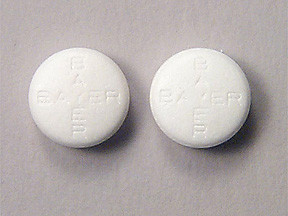
- color
- white
- shape
- round
- imprint
- BAYER BAYER, BAYER BAYER
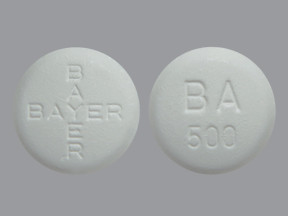
- color
- white
- shape
- round
- imprint
- BAYER BAYER, BA 500
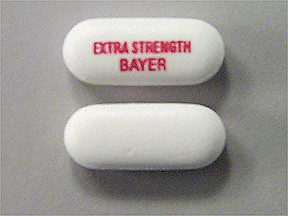
- color
- white
- shape
- oblong
- imprint
- EXTRA STRENGTH BAYER
Reviews
Faq for ASPIRIN - ORAL
Aspirin is a medication belonging to the group of drugs called salicylates. It is commonly used to relieve pain, reduce inflammation, and lower fever. It is also used to prevent heart attacks, strokes, and blood clot formation in certain individuals.
Aspirin works by inhibiting the production of certain chemicals in the body that mediate pain, inflammation, and fever. Additionally, it reduces the aggregation of platelets, which are responsible for blood clot formation.
Some common side effects of aspirin include nausea, heartburn, stomach pain, and upset stomach. It may also cause drowsiness, dizziness, or ringing in the ears. Serious side effects like bleeding or allergic reactions are rare but can occur.
Yes, aspirin is commonly used to treat headaches, including migraines. It can help relieve pain and reduce inflammation that may be causing the headache. However, it is important to follow the recommended dosage and consult a healthcare professional if the headache persists or worsens.
It is generally recommended to avoid aspirin during pregnancy, especially in the third trimester, as it may increase the risk of bleeding complications for the mother and the baby. Pregnant women should consult their healthcare provider before using any medications, including aspirin.
Aspirin should not be given to children and teenagers who have a current or recent viral infection due to the risk of developing Reye's syndrome, a rare but serious condition. Alternative pain relievers, such as acetaminophen or ibuprofen, are recommended for children.
Aspirin may interact with certain medications, including blood thinners, anti-inflammatory drugs, and some asthma medications. It is important to inform your healthcare provider about all the medications you are taking to avoid potential interactions.
Yes, low-dose aspirin is often prescribed to individuals at high risk of cardiovascular events, such as heart attacks or strokes. However, this should be done under medical supervision, as aspirin has potential risks and benefits that need to be considered on an individual basis.
No, aspirin is not addictive. It does not produce a "high" or dependency. However, it is essential to use it as directed and not exceed the recommended dosage to minimize any potential risks and side effects.
Disclaimer
IMPORTANT: HOW TO USE THIS INFORMATION: This is a summary and does NOT have all possible information about this product. This information does not assure that this product is safe, effective, or appropriate for you. This information is not individual medical advice and does not substitute for the advice of your health care professional. Always ask your health care professional for complete information about this product and your specific health needs.
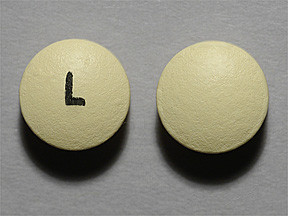

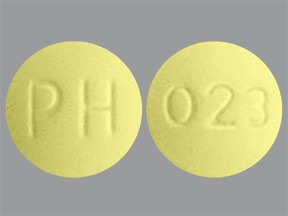
No Reviews Yet